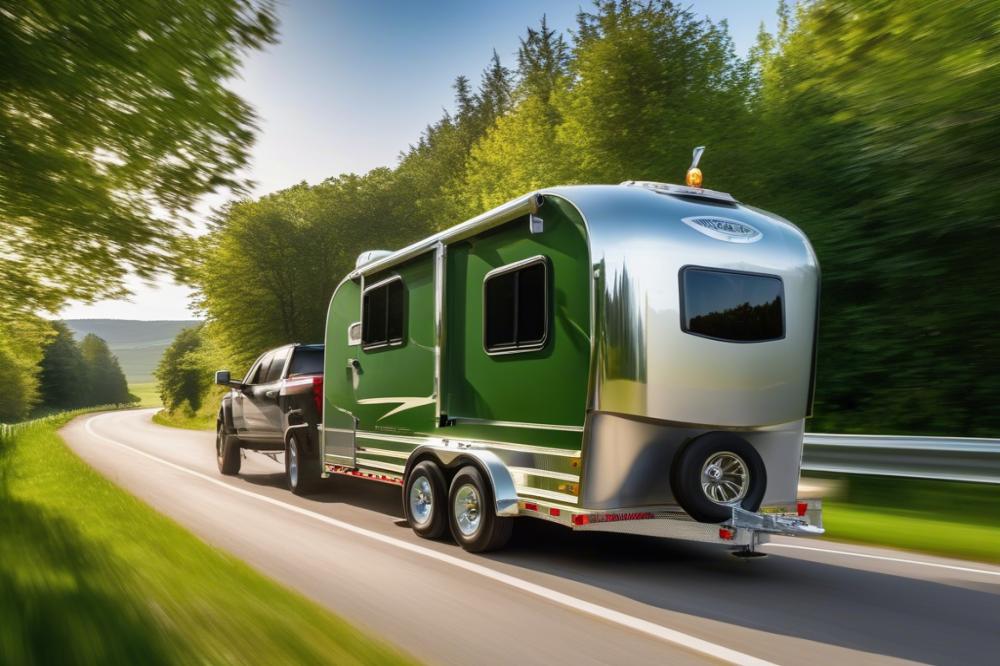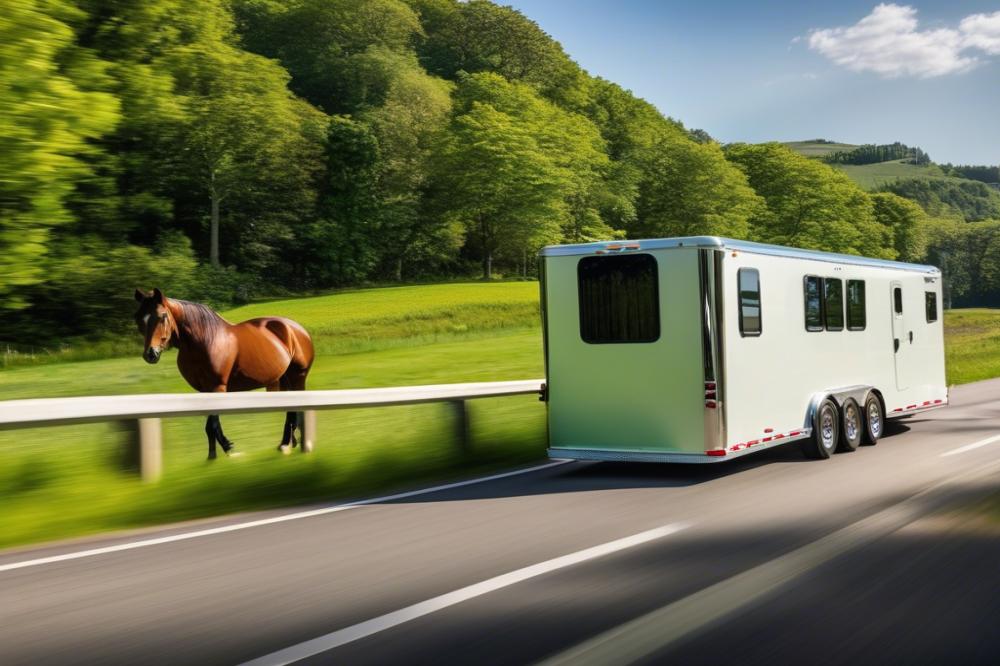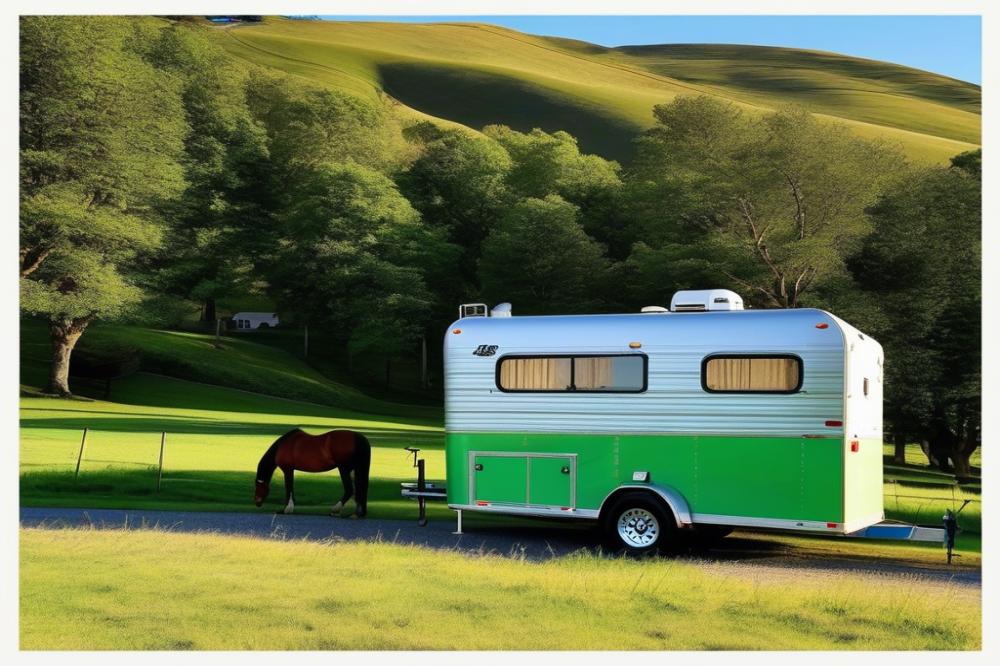Introduction
Transporting horses safely is crucial for countless equestrians. Whether heading to shows, competitions, or veterinary visits, the right gear is essential. Horse transport goes beyond just having a trailer; it’s about the safety of the animals, the drivers, and everyone on the road.
In many areas, a horse trailer towing license is not just needed; it’s a vital requirement. Many people might not realize that operating a vehicle with a trailer involves complex considerations. Different regions have distinct laws governing towing regulations that drivers must understand and follow.
Safety shouldn’t be taken lightly in any context. Proper training and knowledge about towing a horse trailer can prevent accidents and protect both the driver and the horses. Knowing the licensing requirements helps ensure that each journey is conducted safely and within legal guidelines.
Understanding the horse trailer towing license

A horse trailer towing license can be a confusing topic for many drivers. It is crucial to know what this license entails. Towing a trailer requires specific skills and knowledge that differ from regular driving. Without the right qualifications, you may put yourself and others at risk on the road.
Having the correct driver’s license for towing is very important. Most jurisdictions do not allow just anyone to attach a trailer to their vehicle. Regulations are in place to make sure that only qualified drivers operate these heavier loads. Those who tow without the proper license might face fines or legal trouble. Moreover, the chances of accidents increase without the necessary training.
Vehicle Classifications Relevant to Horse Trailers
Understanding vehicle classifications is vital if you plan to tow a horse trailer. Different types of vehicles have different weight limits. For instance, some standard driver’s licenses cover small trailers, while others require a commercial license. Knowing the exact weight of your trailer and cargo is essential for compliance. Drivers also need to consider their vehicle’s Gross Vehicle Weight Rating (GVWR). If the total weight exceeds a certain limit, a special license may be required.
Every state may have varying rules regarding towing. It is advisable to check local regulations before hitting the road. Many areas also require safety inspections for trailers, depending on their size and weight. Knowing these details allows for safer trips and helps you avoid potential pitfalls. Be aware that RVs and horse trailers often fall into different regulatory categories.
Towing Requirements for Horse Trailers

Towing a horse trailer is not just about connecting it to your vehicle. There are specific requirements that you need to know. Understanding these rules is essential for safe and legal towing.
Overview of General towing requirements
Many people underestimate the importance of towing regulations. Different states and regions have various laws. These can include the type of driver’s license needed and the kind of vehicle you can use. Always check local regulations before you hit the road.
Weight Limits and How They Affect Licensing
Weight limits play a significant role in towing. The combined weight of the tow vehicle and horse trailer can affect your need for a special license. Exceeding certain weight thresholds may require a commercial driver’s license or additional endorsements. This means you need to know your trailer’s weight—empty and loaded.
Explanation of Trailer Brakes and Their Legal Requirements
Braking systems on trailers are critical. Many jurisdictions require horse trailers to have their own braking system if they exceed a specific weight. This requirement helps ensure safety while towing. Without proper brakes, it can be challenging to stop, especially with a heavy load.
Importance of Understanding Towing Laws in Different Regions
Laws often vary between states, even within the same country. Some areas may impose stricter regulations. Consequently, what is legal in one place may not be in another. Familiarizing yourself with local laws can save you from fines and ensure a smoother journey.
Licensing Authority and Regulations
The licensing authority plays a crucial role in the process of obtaining towing licenses. Each state has its own governing body that oversees these permits. This organization sets the standards and ensures that applicants meet the necessary criteria to tow a horse trailer. The regulations often vary from one area to another, making it essential for individuals to understand their local rules.
Numerous safety regulations exist for towing a horse trailer. These rules are primarily designed to protect both the driver and the animals being transported. They encompass requirements for vehicle weight limits, braking systems, and proper hitching techniques. Understanding these regulations can help prevent accidents and ensure a safe journey.
Obtaining a license for towing a horse trailer typically involves a series of steps. First, prospective drivers must pass a written test that covers relevant laws. Next, practical driving tests may be required to demonstrate the ability to handle a trailer effectively. It’s advisable to check with local agencies to learn about the specific testing procedures.
Complying with local towing laws is vital for both safety and legal reasons. Ignoring these laws can lead to penalties, fines, or even accidents. Moreover, adhering to regulations contributes to overall road safety for everyone. Towing a horse trailer responsibly benefits the driver, passengers, and the horses on board.
Insurance and Safety Considerations
Overview of Trailer Insurance Requirements
Insurance for hauling a horse trailer is essential. Coverage varies by state and depends on the type of trailer. Many regions require minimum liability insurance. This protects you in case of accidents. Some policies offer coverage for damage to the trailer itself. Knowing the required limits is important before you tow.
Importance of Having Proper Coverage for Horse Trailer Towing
Having adequate insurance is crucial for peace of mind. A well-covered policy can save you from significant financial losses. Accidents can happen, even to experienced drivers. Medical expenses and property damage can quickly add up. Proper coverage helps safeguard you and your horse.
Best Practices for Ensuring Safety During Horse Transport
Safety during transport should be a top priority. Properly secure your horse in the trailer. Make sure the divider is stable and gates are locked. Before setting off, check all tires and lights. Regular maintenance helps catch issues before they become problems. A safety checklist can be very helpful in this regard.
Tips for Safe Towing and Handling Horse Trailers
Use a vehicle that can handle the load. Check your towing capacity before hitting the road. Always drive at safe speeds. Be mindful of stopping distances, as trailers can add weight. Practice makes perfect when it comes to maneuvering. Advanced driving techniques can be beneficial, especially in tight spaces. Lastly, avoid sudden lane changes or sharp turns for a smoother ride.
Wrapping It Up
Let’s recap the essential points about licensing for towing a horse trailer. Each state or region has specific towing requirements that you need to understand before hitting the road. You might need a special license or to meet certain criteria based on the weight of your trailer and vehicle combination. Ignoring these rules can lead to fines or, worse, unsafe situations on the road.
Safety should be your top priority when towing. Licensing is not just a bureaucratic hurdle; it plays a crucial role in keeping you and your horses safe. When drivers are properly licensed, it indicates they have the knowledge necessary to manage the challenges of towing. This is especially important when transporting precious cargo like horses. Poor handling due to lack of training can lead to serious accidents.
It’s also vital to stay up-to-date with local laws and regulations regarding towing. Rules can change frequently, so what was true a year ago may not apply today. Connecting with local towing communities or resources can provide valuable insights. Additionally, check in with your Department of Motor Vehicles or equivalent authority for the latest information. Knowledge is power when it comes to your safety and that of your animals.
In summary, understanding the licensing requirements for towing a horse trailer is essential. Knowledge not only helps you avoid legal issues but also ensures safer journeys for everyone involved. Make it a habit to review and educate yourself about relevant towing laws. Your commitment to compliance will lead to safer roads for everyone.



